Overview
To get motivated to lose weight when depressed, individuals can implement small, manageable strategies, establish routines, and seek social support to enhance their motivation and mental well-being. The article emphasizes the importance of starting with achievable goals, practicing self-compassion, and leveraging community encouragement, all of which can significantly improve one's drive and ability to overcome the challenges posed by depression while pursuing weight loss.
Introduction
In a world where mental health challenges often overshadow personal goals, the journey to weight loss can feel daunting, especially for those grappling with depression. Understanding the intricate link between emotional well-being and motivation is essential for anyone aiming to reclaim their health.
As research highlights the profound impact of mental health on physical outcomes, it becomes clear that empowering individuals with effective strategies is vital. From setting realistic goals to harnessing the power of social support, there are actionable steps that can reignite motivation and foster resilience.
By prioritizing these approaches, organizations can create an environment that not only supports individual journeys but also cultivates a culture of well-being and success.
Understanding the Link Between Depression and Weight Loss Motivation
Depression can deeply influence drive, which raises the question of how to get motivated to lose weight when depressed, creating considerable obstacles to reaching fitness objectives. Individuals grappling with feelings of sadness, fatigue, or hopelessness often seek advice on how to get motivated to lose weight when depressed, as their drive to engage in healthy behaviors is severely diminished. Acknowledging these feelings is crucial; understanding that depression is a prevalent mental health concern can validate the struggles faced by many.
Research indicates that participants receiving Sibutramine Plus Brief Therapy lost an average of 7.7% of their initial mass over a year, underscoring the potential for progress even amid mental health challenges. As Dr. Myles S. Faith observes, "It is crucial to acknowledge the complex connection between mental well-being and the drive for reducing body mass." Significantly, seeking assistance—whether through therapy, support groups, or discussions with trusted friends—constitutes a brave and positive step towards not only addressing mental health but also figuring out how to get motivated to lose weight when depressed.
Furthermore, recent studies emphasize the need for further research on treating obesity in individuals facing major depression, as highlighted in the case study titled "Implications for Future Research." This highlights the significance of a balanced approach combining mental health support with management strategies. Enabling your team to identify and address these challenges can result in transformative results, allowing them to regain their drive and ultimately achieve success in their journeys.
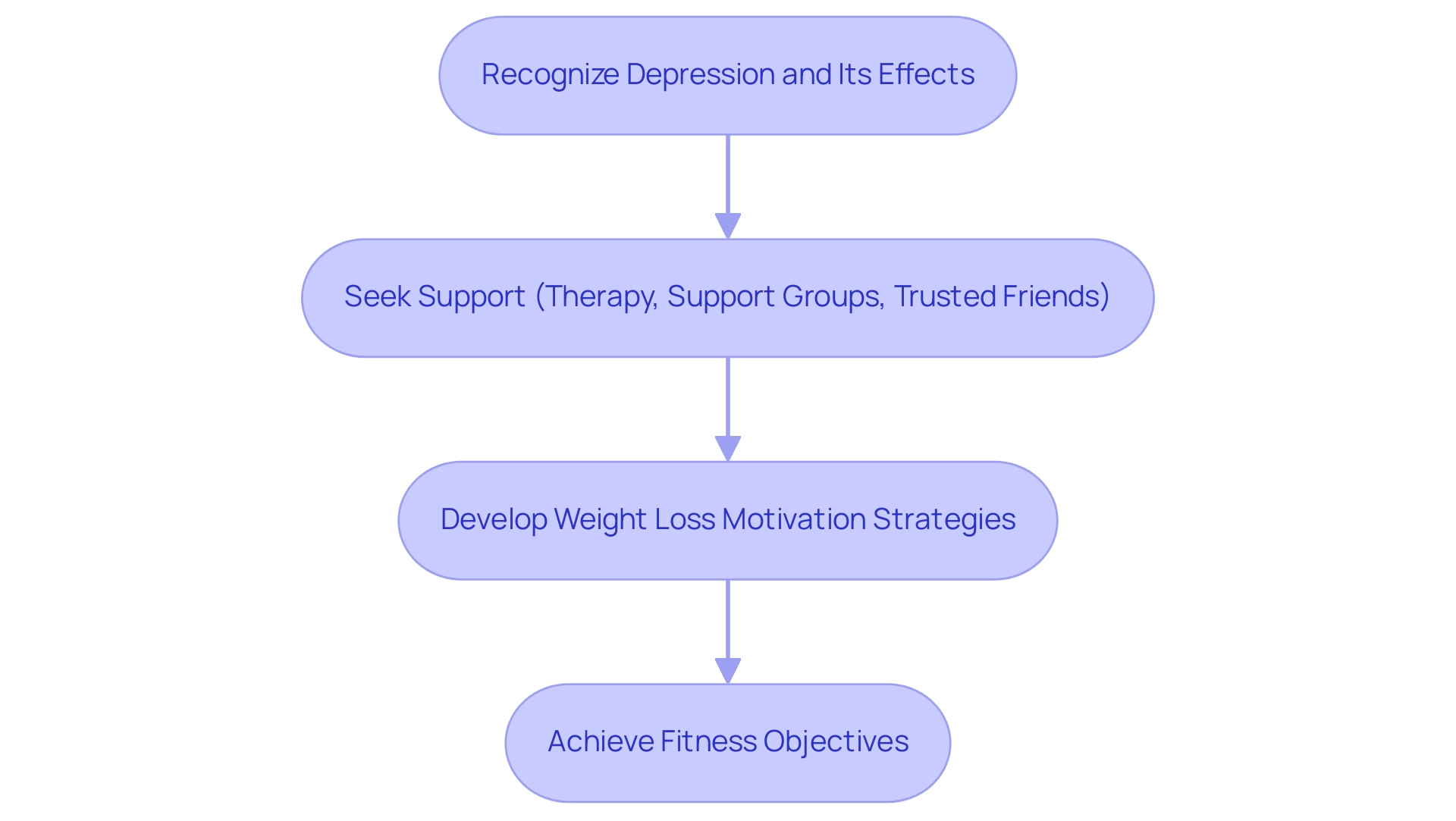
Effective Strategies to Boost Motivation for Weight Loss During Depression
When it comes to discovering how to get motivated to lose weight when depressed, implementing a few straightforward yet impactful strategies can make all the difference. Here are some tailored approaches that can be enhanced through our comprehensive wellness coaching app:
-
Start Small: Initiate your journey with manageable activities, such as a brief daily walk.
This simple step, complemented by our daily workout features and access to our extensive 350+ movement catalog, can lay the groundwork for bigger changes. Research by Wing et al. indicates that even small interventions can lead to significant reductions in mass and depressive symptoms, highlighting the effectiveness of starting small.
-
Create a Routine: Establish a consistent daily schedule that incorporates time for physical activity and meal preparation.
Our app provides guided nutrition and workout plans, along with an accountability and data hub, that can help you structure your routine, providing stability and making healthy choices easier.
-
Celebrate Small Wins: Recognize and reward yourself for achieving minor goals, like opting for a nutritious meal or completing a workout.
Our app encourages community support, allowing you to share these victories with like-minded individuals during bi-weekly group calls to boost your confidence and motivate further progress.
-
Practice Self-Compassion: Embrace kindness toward yourself; understand that setbacks are a natural part of the journey.
Malia Frey, a body transformation specialist, emphasizes that those experiencing distressing thoughts about their body may face emotional challenges, which can result in avoidance behaviors.
By practicing self-compassion and accessing personalized support through our app, you can discover how to get motivated to lose weight when depressed more effectively.
-
Visualize Success: Dedicate time to imagine how reaching your goals will enhance your life.
This mental imagery can strengthen your resolve and commitment to change. Additionally, our app includes mindset strategies that can aid in fostering a positive outlook.
It's important to acknowledge the bidirectional connection between depression and reduction in body mass, as discussed in the case study titled 'The Psychological and Physiological Impact.'
Addressing both aspects can reinforce the strategies presented. By focusing on these small yet significant steps, bolstered by the resources available in our wellness app, you can cultivate a more positive mindset and foster resilience in the face of adversity.
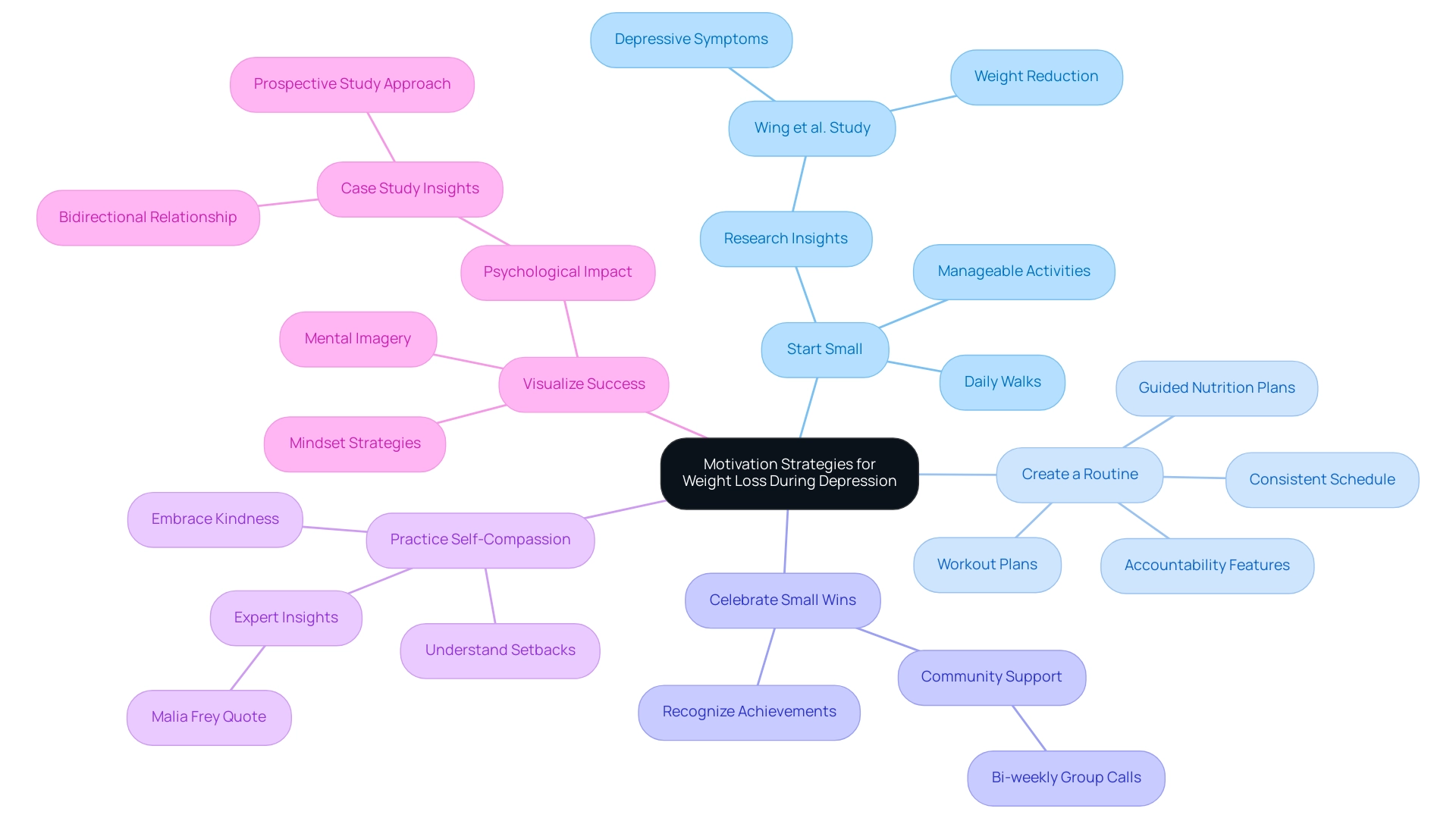
Setting Realistic Goals: A Key to Sustaining Motivation
Establishing achievable targets for reducing body mass is essential for understanding how to get motivated to lose weight when depressed, particularly during difficult periods, especially with obesity-related healthcare expenses anticipated to increase by up to $66 billion each year by 2030. Prioritizing effective weight loss strategies is more critical than ever. Consider breaking down larger objectives into smaller, more achievable steps—aiming to lose 1-2 pounds per week instead of 20 pounds in a month.
This approach aligns with the SMART criteria—Specific, Measurable, Achievable, Relevant, and Time-bound. For instance, a SMART goal could be: 'I will lose 1 pound per week by exercising three times a week and tracking my calorie intake.' Our health coaching app supports this process by providing tools for tracking progress and setting personalized goals.
Documenting your objectives and consistently monitoring your progress can greatly enhance drive, and the app enables you to record your food consumption and exercise effortlessly, which is essential for understanding how to get motivated to lose weight when depressed. Sharing these goals with a trusted friend or family member can enhance accountability and support. Crucially, take the time to celebrate each milestone, regardless of size, as this practice can help you understand how to get motivated to lose weight when depressed by encouraging ongoing enthusiasm.
Notably, among Gen X women, 40% focus solely on dieting, highlighting a key demographic's motivation. Moreover, research indicates that participants in the 'target set' group attended more sessions and attained greater reductions in body mass compared to the 'non-target set' group. Remember, your efforts not only impact individual well-being but also contribute to a healthier workplace environment.
To further support your journey, consider signing up for our free 7-day trial of the Foresight Health Coaching app. Experience its transformative power, explore our comprehensive strategies, and empower your team towards achieving their wellness goals. The app provides tailored coaching and reminders to help you stay on course, guaranteeing you receive the assistance you require during your journey to shed pounds.
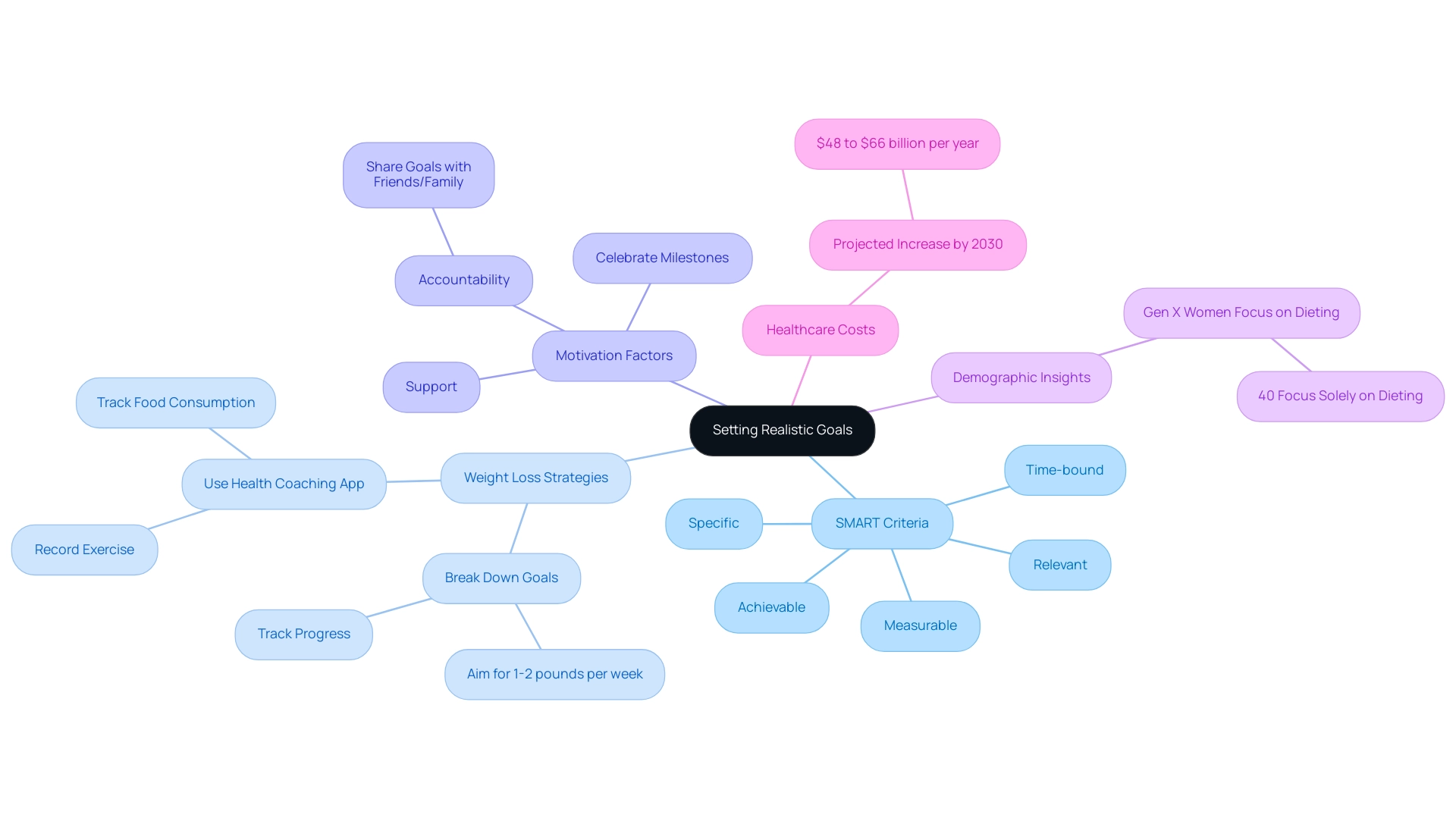
The Role of Exercise in Enhancing Mood and Motivation
Engaging in physical activity is a potent way to elevate your mood and combat feelings of depression, which can help you understand how to get motivated to lose weight when depressed, largely due to the endorphins released during exercise. Incorporating movement into your daily life can be straightforward; opt for walking instead of driving, take the stairs whenever possible, or consider joining a local fitness class. Strive for at least 30 minutes of moderate exercise on most days to harness these benefits effectively.
If you notice your drive diminishing, consider collaborating with a friend or engaging in group activities as ways to understand how to get motivated to lose weight when depressed. Our wellness coaching app takes this a step further by offering personalized workouts and nutrition guidance, ensuring that you stay engaged and motivated. The app features video demonstrations that cater to visual learners, allowing you to see exercises in action before trying them out yourself.
Additionally, the movement flows incorporated into the app help keep your body moving and feeling great throughout the day. Choi reminds us that
Intentionally moving your body in more gentle ways throughout the day — like walking, stretching, taking the stairs, doing the dishes — can still add up in good ways for your mood.
This approach not only helps maintain your commitment but also shows you how to get motivated to lose weight when depressed by ensuring you engage in activities you love, which significantly boosts your mood.
The importance of these practices is underscored by research showing that addressing individual factors can enhance adherence to exercise programs by as much as 25%. Utilizing health tools within our app, such as BMI calculators and direct messaging with coaches, allows for personalized fitness goals and progress tracking. Furthermore, findings from Blumenthal et al.'s study highlight that while medication may provide quicker symptom relief, participants in the exercise group demonstrated lower rates of depression at the 10-month follow-up, illustrating the lasting impact of physical activity on mental health. Additionally, Schuch et al. emphasize the significant association between cardiorespiratory fitness and incident depression, reinforcing the notion that improving fitness can lead to better mental health outcomes.
Embracing these strategies through our comprehensive health coaching services can lead to a healthier, more motivated you, all while enjoying the convenience of accessing everything you need in one place.
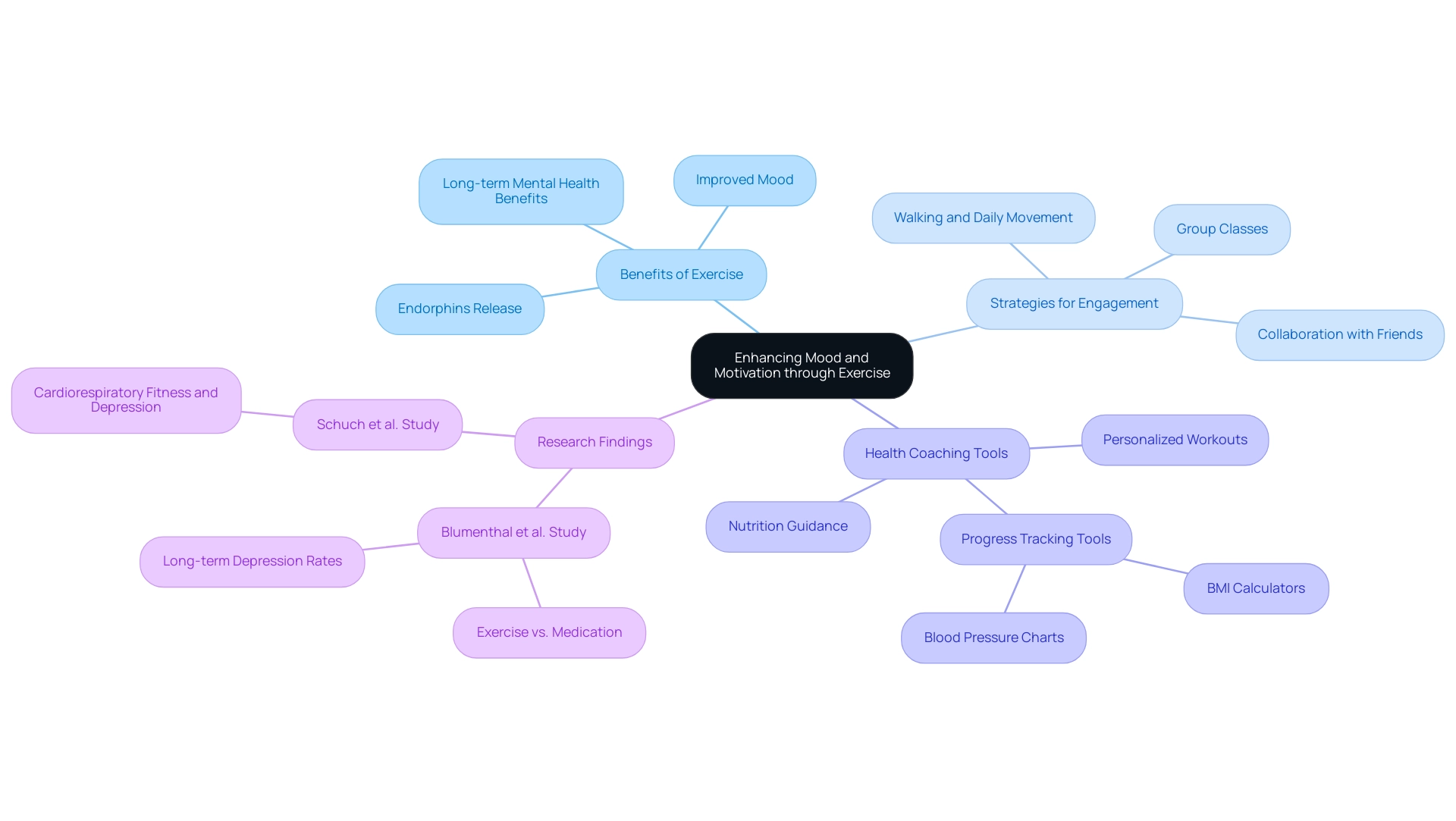
Harnessing Social Support for Weight Loss Motivation
The impact of social support in body transformation journeys is crucial for understanding how to get motivated to lose weight when depressed, as it serves as a powerful motivator. Research shows that family members often provide the most consistent encouragement while also presenting challenges regarding healthy eating and physical activity. Interacting with friends, family, or colleagues who align with your health objectives can significantly boost encouragement and accountability.
In fact, shared experiences were reported by 42.5% of survey respondents, underscoring the importance of a supportive network. Consider joining a support group or an online community that discusses how to get motivated to lose weight when depressed, to connect with individuals who understand your struggles and triumphs. Activities like exercise classes or structured weight loss programs can further bolster motivation through shared experiences and camaraderie.
At our organization, we provide personalized coaching led by experienced professionals who utilize evidence-based techniques to help individuals gain knowledge and skills for a healthier life and make lasting lifestyle changes. As one of our clients noted, 'the personalized support I received was key in helping me start my journey towards a better you.' By surrounding yourself with a network of supportive individuals and leveraging personalized guidance, you can discover how to get motivated to lose weight when depressed and make remarkable strides toward improved health and well-being.
Let’s discuss how we can help you thrive in the modern world while learning from the wisdom of the past. Contact us today to schedule a consultation!
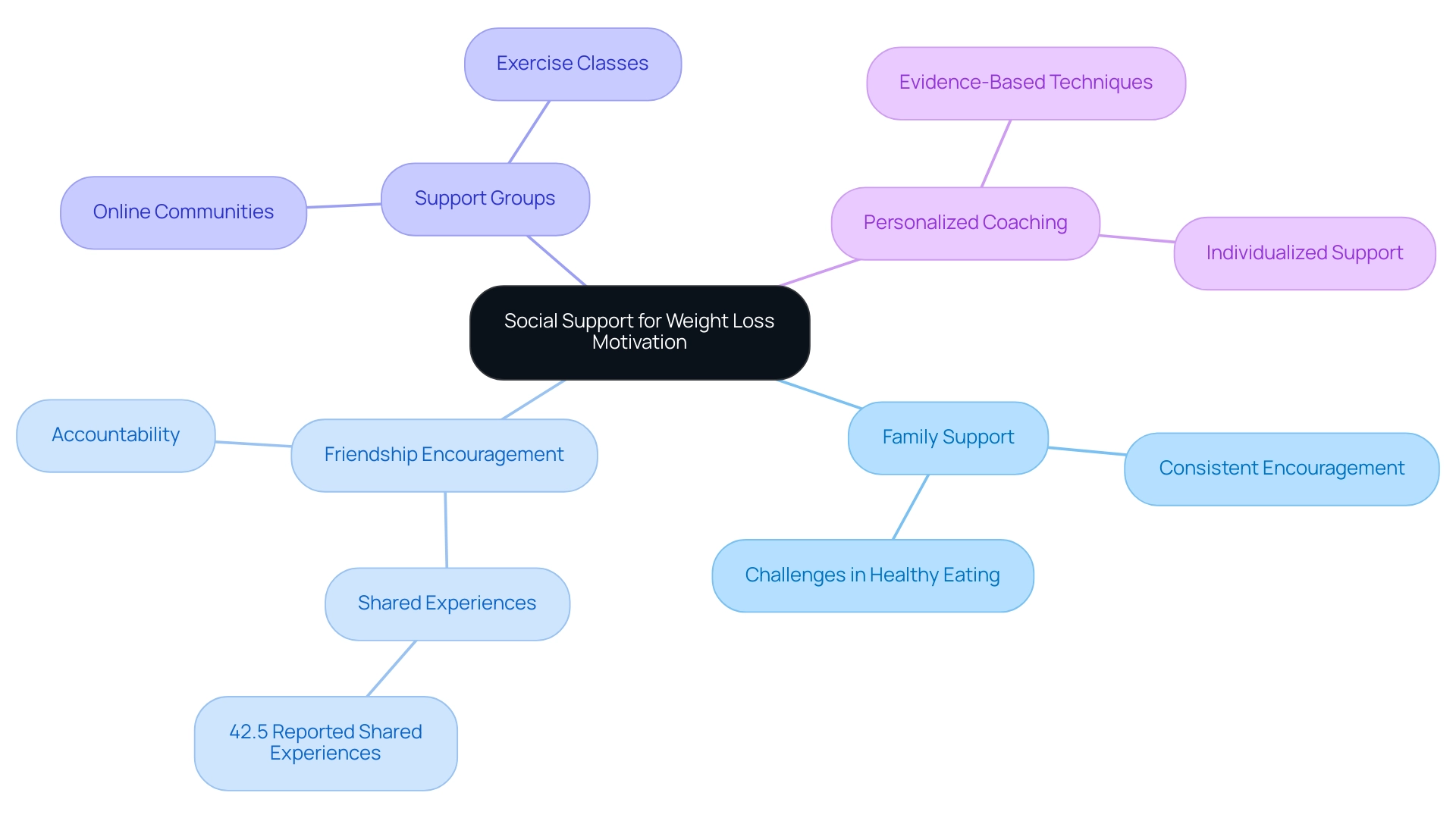
Conclusion
The journey to weight loss, particularly for those facing the challenges of depression, is undeniably complex but entirely achievable with the right strategies in place. Recognizing the profound impact that mental health has on motivation is the first step towards fostering resilience and reclaiming one's health. By implementing effective strategies—such as:
- Starting small
- Creating a routine
- Celebrating small wins
- Practicing self-compassion
- Visualizing success
individuals can cultivate a more positive mindset and enhance their motivation.
Setting realistic goals plays a pivotal role in this process, allowing individuals to break down overwhelming objectives into manageable steps. This not only boosts motivation but also encourages accountability and support from peers, which is essential for sustained progress. The integration of social support further amplifies this journey, as shared experiences and encouragement from friends, family, or support groups can significantly enhance motivation and foster a sense of community.
Ultimately, prioritizing mental health alongside physical health is crucial for achieving lasting weight loss success. Organizations that empower their teams to recognize and confront these challenges can create a culture of well-being that benefits everyone. By leveraging the tools and resources available, such as wellness coaching apps and personalized support, individuals can navigate their weight loss journeys with renewed confidence and determination. Now is the time to take actionable steps toward a healthier, more fulfilling life, where mental and physical well-being go hand in hand.
Frequently Asked Questions
How does depression affect motivation to lose weight?
Depression can significantly diminish an individual's drive to engage in healthy behaviors, making it challenging to stay motivated for weight loss efforts.
What are some strategies to get motivated to lose weight when depressed?
Effective strategies include starting small with manageable activities, creating a consistent routine, celebrating small wins, practicing self-compassion, and visualizing success.
Why is it important to acknowledge feelings of depression when trying to lose weight?
Acknowledging feelings of depression is crucial as it validates the struggles faced by many individuals and highlights the complex connection between mental well-being and the drive to reduce body mass.
What role does support play in overcoming weight loss challenges related to depression?
Seeking assistance through therapy, support groups, or discussions with trusted friends is a positive step that can address mental health issues and help individuals find motivation for weight loss.
What does research say about weight loss in individuals dealing with depression?
Research indicates that participants receiving treatment, such as Sibutramine Plus Brief Therapy, can achieve significant weight loss, suggesting progress is possible even amidst mental health challenges.
How can starting small help in the weight loss journey?
Initiating with small activities, like a brief daily walk, can lead to significant reductions in weight and depressive symptoms, making it easier to build momentum for larger changes.
How can a routine benefit someone trying to lose weight while depressed?
Establishing a consistent daily schedule that includes time for physical activity and meal preparation can provide stability and make healthy choices easier.
What is the importance of celebrating small wins in the weight loss journey?
Recognizing and rewarding small achievements can boost confidence and motivation, making it easier to continue progressing towards larger goals.
How does self-compassion play a role in weight loss efforts for those with depression?
Practicing self-compassion helps individuals understand that setbacks are a natural part of the journey, encouraging them to stay engaged rather than avoiding healthy behaviors.
What is the significance of visualizing success in the weight loss process?
Visualizing how achieving weight loss goals will enhance one’s life can strengthen resolve and commitment to change, fostering a more positive mindset.

